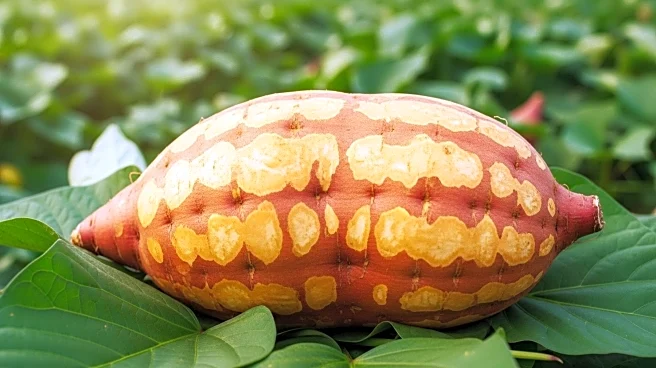What is the story about?
What's Happening?
A team of scientists led by Professor Zhangjun Fei at the Boyce Thompson Institute has successfully decoded the complex genome of the sweetpotato, a staple crop crucial for food security in sub-Saharan Africa. The research, published in Nature Plants, utilized advanced DNA sequencing techniques to unravel the sweetpotato's hexaploid genome, which consists of six sets of chromosomes. This breakthrough allows for a detailed understanding of the sweetpotato's genetic makeup, revealing its origins as a mosaic of multiple wild ancestors. The study identified significant genetic contributions from species such as Ipomoea aequatoriensis and Ipomoea batatas 4x, highlighting the plant's unique genomic architecture. This research marks the first time the sweetpotato's 90 chromosomes have been fully phased, providing unprecedented clarity into its genetic story.
Why It's Important?
The successful decoding of the sweetpotato genome is a significant advancement in agricultural science, with potential implications for global food security. Sweetpotatoes are vital for millions, particularly in regions vulnerable to climate change and food scarcity. Understanding the genetic complexity of this crop enables breeders to identify and enhance traits such as disease resistance, drought tolerance, and nutritional content. This could lead to the development of more resilient sweetpotato varieties, crucial for subsistence farmers facing increasing environmental challenges. Furthermore, the methodologies applied in this research can be extended to other polyploid crops like wheat and cotton, aiding in the breeding of resilient crops worldwide.
What's Next?
Following this genomic breakthrough, researchers aim to decode the genomes of various sweetpotato varieties from different regions to capture a broader spectrum of genetic diversity. This will help identify unique genetic traits that may have been lost in some varieties but are present in others. The insights gained could accelerate the breeding of sweetpotatoes with enhanced traits, supporting efforts to improve food security in vulnerable regions. Additionally, the techniques developed in this study may be applied to other complex genomes, potentially revolutionizing crop breeding practices globally.
Beyond the Headlines
The research into the sweetpotato genome not only advances agricultural science but also highlights the importance of genetic diversity in crop resilience. The study underscores the role of polyploidy in providing plants with genetic 'backup' systems, enhancing their ability to adapt to environmental stresses. This genetic buffering is crucial as climate change continues to impact agricultural productivity. The findings also emphasize the need for continued investment in genomic research to address future food security challenges.
















